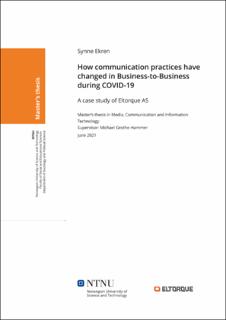| dc.contributor.advisor | Grothe-Hammer, Michael | |
| dc.contributor.author | Ekren, Synne | |
| dc.date.accessioned | 2021-09-28T17:35:29Z | |
| dc.date.available | 2021-09-28T17:35:29Z | |
| dc.date.issued | 2021 | |
| dc.identifier | no.ntnu:inspera:80181548:17352730 | |
| dc.identifier.uri | https://hdl.handle.net/11250/2784607 | |
| dc.description.abstract | Den raske spredningen av COVID-19 har forårsaket betydelige utfordringer for business-to-business (B2B). Dette er spesielt relevant for markedsføring og salg, noe som muliggjør kommunikasjon mellom agenter. For å utforske forskningsspørsmålet har jeg brukt praksissteori og sosial utvekslingsteori (SET). Denne artikkelen undersøker hvordan kommunikasjonspraksiser har endret seg under COVID-19-pandemien i B2B. Forskningspørsmålet blir dermed: Hvordan har B2B kommunikasjonspraksiser blitt endret under COVID-19 pandemien, og hvilke type utfordringer gir de nye kommunikasjonspraksisene?
Studien bruker Eltorque AS som casestudie som ved hjelp av dybdeintervju med salgssjefer og salgspersoner, kan bidra til å svare på forskningsspørsmålet. Åtte salgssjefer og salgspersoner ble intervjuet, som gjennom transkripsjon og koding avdekket to hovedkategorier. Kategoriene avdekket flere fremgangsmåter og strategiske endringer som kan være gunstige for små og mellomstore B2B. Disse to kategoriene var praksiser som gjenstår, men som er vesentlig endret, og ny praksis som dukket opp.
Jeg hevder at noen av problemene som vises i kommunikasjonspraksisbaserte tilnærminger og ved å anvende sosial utvekslingsteori, knyttet til undersøkelser av kommunikasjon og interaksjon i B2B-innstillinger, kan være med på å bedre forstå dynamikken i hvordan salgsledere og salgspersoner kommuniserer med kunder gjennom COVID-19 pandemien. SET konsentrerer seg om forholdet mellom utvekslingspartnere for utveksling. Derfor er det gunstig å forklare B2B relasjonsutveksling.
Funnene i denne studien viser at det er mer utfordrende å skape tillit og analysere intervjuobjektenes kroppsspråk når man har et virtuelt møte. Likevel har virtuelle salg blitt en stor del av salgssjefens daglige drift. Det har vist seg å være både tids- og kostnadseffektivt for å skaffe nye kunder, men mangelen på mellommenneskelig kommunikasjon og samhandling kan skade forhandlingsresultatene. Et interessant funn i denne studien er hvordan salgssjefene bruker mobiltelefonene sine til å kontakte kunder eller forretningspartnere. Resultatene i denne studien kan være nyttige for andre salgssjefer og salgspersoner som sliter med kommunikasjon i denne krisen. Det kan også være gunstig for en fremtidig krise, for eksempel en finanskrise. | |
| dc.description.abstract | The rapid spread of COVID-19 has caused significant challenges to business-to-business (B2B) firms. This is particularly relevant for marketing and sales operations, enabling communication between agents, customers, and business partners. This paper examines how communication practices have changed during the COVID-19 pandemic in B2B settings. Therefore, the research question is: How did B2B communication practices change during the COVID-19 pandemic, and what types of challenges do the new communication practices give?
The study uses Eltorque AS as a case study, using in-depth interviewing with sales managers, which can help to answer the research question. Practice theory and social exchange theory (SET) is used to explore the research question. Eight sales managers were interviewed, which through transcription and coding, revealed two main categories. The categories announced several practices and strategic changes that might be beneficial for small-to-medium B2B. These two categories were practices that remain but are substantially changed, and new practice emerged.
I claim that some of the issues appearing in communication practice-based approaches and by applying social exchange theory, connected to investigations of communication and interaction in B2B settings, could better understand the dynamics of how communication has changed and how sales managers are communicating with customers throughout the COVID-19 pandemic. SET concentrates on the relationship among exchange parties as to the governance mechanism of exchange. Therefore it is beneficial for explaining B2B relational exchange.
The findings in this study show that it is more challenging to create trust and analyse the interviewees' body language when having a virtual meeting. Nevertheless, virtual selling has become a large part of the sales managers everyday operations. It has shown to be both time- and cost-effective in gaining new customers, but the lack of interpersonal communication and interaction might harm the negotiation results. An interesting finding in this study is how the sales managers use their mobile phones to contact customers or business partners. The conclusions of this study might be helpful for other sales managers, which are struggling with communications in this crisis. It can also be beneficial for a future situation, such as a financial crisis. | |
| dc.language | eng | |
| dc.publisher | NTNU | |
| dc.title | How communication practices have changed in Business-to-Business during COVID-19: A case study of Eltorque AS. | |
| dc.type | Master thesis | |
